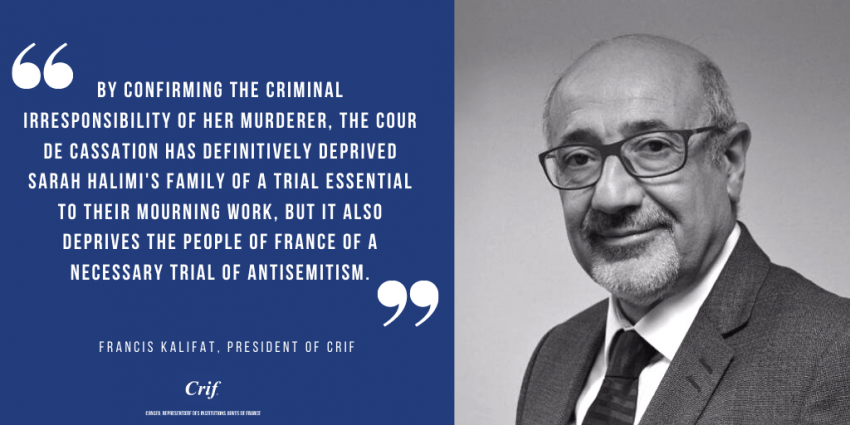 English
English Français
Français
News
|
Published on 16 April 2021
Crif/Op-Ed - Sarah Halimi : "There cannot be law without Justice"

In a democracy worthy of the name, fools are not judged. But in a democracy, one does not consider as criminally irresponsible somebody who, by his own actions – here by heavy consumption of drugs – has triggered his mental condition.
How can a society accept that a “sharp delusional puff” due to cannabis consumption allows the perpetrator of an antisemitic crime to escape responsibility ?
Would cannabis become an excusing factor for antisemitic murder when it is an aggravating factor for all other crimes ?
How can one understand that the question of his irresponsibility has never arisen in any of the many legal proceedings the perpetrator has been subjected to in the past ?
If his mental state at the time of the crime has exacerbated his antisemitism – as all the reports seem to indicate – why refuse to see that there was antisemitism indeed prior to the use of drugs ?
By confirming the criminal irresponsibility of her murderer, the Cour de Cassation has definitively deprived Sarah Halimi's family of a trial essential to their mourning work, but it also deprives the People of France of a necessary trial of antisemitism.
By basing its decision on article 122-1 paragraph 1 of the Penal Code which does not make a distinction according to the origin of the mental disorder having concluded in the abolition of discernment, the Cour de Cassation said the Law, not Justice.
To deliver Justice, the magistrates of the Cour de Cassation lacked courage and showed cowardice. Rather than take the courageous responsibility of a landmark decision, as she has the opportunity, she passed that task to the legislators.
In addition, another possibility was presented the Cour, that of refusing to settle a debate between expert psychiatrists who disagreed between abolition and impairment of discernment.
Without perfect unanimity between the different experts on abolition or alteration, the doubt should have benefited the victim, not the accused.
Here again, the courage would have been to leave the responsibility for this debate to an Cour d’Assise with a People's Jury.
The verdict, whatever it would have been, would not have opened the way to any challenge, because it would have been delivered in the name of the French people.
Montesquieu tells us that "A thing is not right because it is law, but it must be law because it is just".
If law enforcement leads to the situation we are in, and the unfairness of that decision, the law must be changed very quickly.
Francis Kalifat, President of Crif
